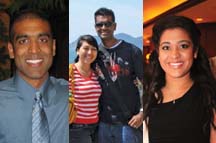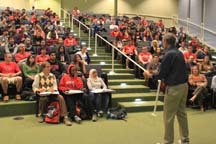areté Alumni News

The Karim Family Legacy
Alumni legacy family Jason, Justin and Nadia, and Alicia Karim share their stories.

by Richard Armstrong
The Human Situation, the gateway course to the Honors experience, continues to thrive with a participating faculty of 14 professors this fall. Team Omega got into an Egyptian swing in honor of the King Tut exhibit hosted by the Museum of Fine Arts Houston (MFAH). They used the Egyptian Book of the Dead to begin the term’s discussion of “The Living and the Dead,” the theme for this year’s Omega booklist, which included the Biblical book of Exodus, The Odyssey, Sophocles’ Antigone, Aristophanes’ Frogs, Plato’s Phaedrus, The Golden Ass of Apuleius, and the Qur’an (with special lectures by the University’s new professor of Arabic, Dr. Emran El-Badawi).
 All Human Situation students enjoyed a guest lecture by Dr. Bob Brier of Long Island University, who related his experience performing the first mummification in over 2000 years of a real human cadaver using only ancient Egyptian methods and tools (a feat that has earned him the nickname “Mr. Mummy”). “It was a perfect presentation for Halloween weekend. It was very interesting and delightfully grotesque, and the students really enjoyed it. "I always thought you had to make a slurry of the brain to extract it through the nose, and I was overjoyed to be proved right,” said Dr. Helen Valier, who helped sponsor the lecture under the auspices of the Medicine & Society Program. Omega’s Egyptomania culminated in a final lecture at the MFAH with a visit to the King Tut exhibit.
All Human Situation students enjoyed a guest lecture by Dr. Bob Brier of Long Island University, who related his experience performing the first mummification in over 2000 years of a real human cadaver using only ancient Egyptian methods and tools (a feat that has earned him the nickname “Mr. Mummy”). “It was a perfect presentation for Halloween weekend. It was very interesting and delightfully grotesque, and the students really enjoyed it. "I always thought you had to make a slurry of the brain to extract it through the nose, and I was overjoyed to be proved right,” said Dr. Helen Valier, who helped sponsor the lecture under the auspices of the Medicine & Society Program. Omega’s Egyptomania culminated in a final lecture at the MFAH with a visit to the King Tut exhibit.
Alpha students focused on the theme of “Punishment,” and in addition to The Odyssey and Frogs, read the Book of Job, Aeschylus’ Eumenides, Thucydides’ History, Plato’s Apology of Socrates and Crito, Vergil’s Aeneid, the Gospels of Mark and Luke, and Epictetus. Professors were whipped into an Aeschylean chorus in Dr. Kim Meyer’s Eumenides lecture, and students performed their impersonations of professors during Dr. Gabriela Maya’s lecture on the Frogs. The aria “Dido’s Lament,” from Purcell’s Dido and Aeneas, was sung by Honors student Alyssa Weathersby as a special treat in Dr. Meyer’s lecture on the Aeneid. Perhaps the best surprise was the appearance of two Honors students in the roles of Dionysus and his slave during Dr. Ted Estess’ lecture on the Frogs, fully…equipped, shall we say, with balloons in the appropriate Dionysian places.
As the course continues to Modernity this spring, Alpha’s theme will be “Voices from the Edge,” featuring works by Shakespeare, Hume, Wollstonecraft, Charlotte Brontë, Turgenev, Yeats, and a contemporary Irish play by Brian Friel, Translations. Omega forges on with “The Soul and the Self,” and has lined up an all-star booklist of Dante, Shakespeare, Locke, Hume, La Mettrie, Emily Dickinson, Tolstoy, Yeats, Primo Levi, and Akhmatova; ending the game, fittingly, with Beckett’s Endgame.
In addition to the usual combination of plenary lectures and intimate seminars, Human Situation students also flocked to a set of extra lectures by seasoned professors in our Writing Craft Talks. Professor Kim Meyer lectured on the art of passionate reading, Robert Cremins explained the delicate art of formulating an interesting thesis, Professor Gabriela Maya explored the use of textual evidence, and Dr. Iain Morrisson contended that writing a paper is a creative process.
The Craft Talks are part of a larger Honors Writing Initiative attached to the course, which includes a cohort of 16 student peer tutors to assist Human Situation students in drafting their many papers for class. Cremins, an organizer of the Writing Initiative, will also be taking the crafts talks on the road to area high schools to help spread the gospel of good writing and the mission of the College. “We were actually contacted by area high schools about these talks, so it seemed a natural thing to do,” said Cremins.
Another Human Situation perk this term is the Omega Profblog, a place for reflection on the course theme and beyond by Human Situation professors, colleagues, and friends.
The theme of the “Living and the Dead” yielded some fascinating entries. Cremins wrote about death in Ireland and penned an original short story in dialogue with the biblical Joseph story; Dr. Sue Collins reminisced about the banshee in the Irish-Canadian culture of her youth; Dr. Jonathan Zecher shared Orthodox Christian beliefs about death and burial; Dr. John Harvey chimed in with personal remembrances about his parents’ deaths and stories about dead goats in a green truck; Professor Kim Meyer shared her experiences traveling in the Sinai Desert; Dr. Richard Armstrong pondered the meaning of memorials at Ground Zero and Marathon; and as a special guest, Armstrong’s brother, the poet James Armstrong, contributed from far off Minnesota a poem cycle, The Tower Variations, a rumination about the post- 9/11 world centered on the indelible and horrific image of one of the attack’s falling victims. Omega students chimed in enthusiastically with their comments on the blog, as the reader is also encouraged to do, by going to http://omegaprofblog.blogspot.com/.
The Human Situation continues to offer the Best Human Situation Essay Prize, a contest that highlights outstanding student work. At the 2011 Fall Convocation, Dean Bill Monroe recognized John T. Kramer and Adam Brewer for their outstanding Human Situation essays from the 2010-2011 academic year. In addition, the Human Sit faculty members offered honorable mention to essays by John F. Kramer, Nicholas Heisig, Maryam Burney, Katie Teeters, and Savannah Freeland.
This year, however, the students also get a chance to pick their own winners in the first Human Situation Best Lecture awards. A student committee for each Human Sit team will select the best lecture, based upon nominations made by all the team’s students. Visit TheHumanSituation.com to read about the winners.